In this post, we will discuss the best cross-chain aggregators that deal with small transactions. These services allow users to transfer assets from one blockchain to another with the least fees and quickest confirmations.
If you’re bridging tokens or network-swapping, picking the right aggregator matters. Let’s look for the best low-cost options that can can offer almost instantaneous transfers.
Key Points & Best Cross-Chain Aggregator For Small Transactions List
| Aggregator | Key Features for Small Transactions |
|---|---|
| 1inch | Pathfinder algorithm splits trades for best rates; gas optimization; wide token support across chains. |
| DeFiLlama | Meta-aggregator with LlamaZip router for low gas costs; supports 20+ chains; privacy-focused. |
| OpenOcean | Compares liquidity across DEXs; supports 23 chains including Solana; offers fiat on-ramp. |
| Matcha | Gasless trading via 0x Protocol; low fees; simple UI; supports 8 blockchains. |
| ParaSwap | Smart routing for reduced slippage; OTC and limit orders; fast execution on 7 chains. |
| Across Protocol | Fast bridging; optimized for low fees; ideal for small cross-chain transfers. |
| Synapse Protocol | Cross-chain liquidity and interoperability; secure and scalable for DeFi apps. |
| Portal Token Bridge | Speed-focused token transfers; cost-efficient bridging across chains. |
| Hop Protocol | Low-cost transfers across Ethereum Layer 2; fast execution; good for small swaps. |
| Allbridge | Supports multiple chains; simple asset transfers; low fees for small transactions |
10 Best Cross-Chain Aggregator For Small Transactions
1.1inch
1inch is a dex aggregator known for its effective routing and low slippage for small transactions. It taps liquidity from over 100 DEXs on 13+ blockchains, such as Ethereum, Solana, and zkSync.
The platform uses the Pathfinder algorithm to identify the optimal swap routes and auto MEV to protect users from front-running.
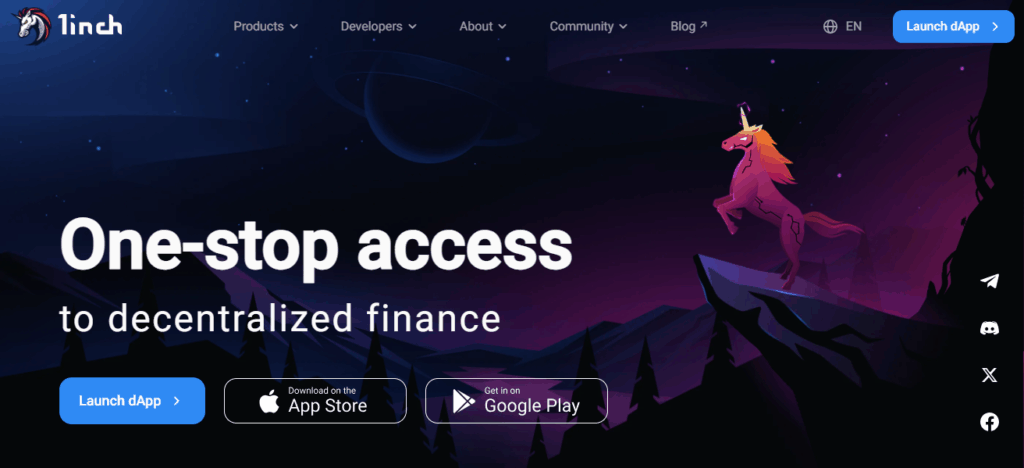
Also, MEV is protected by the outroute. In addition, 1inch’s Fusion+ feature allows gasless swaps, which provides smart trade users the additional efficiency on costs.
| Feature | Description |
|---|---|
| Aggregation Engine | Finds best prices across multiple DEXs using Pathfinder algorithm |
| Gas Optimization | Splits trades to reduce gas fees |
| Supported Chains | Ethereum, BNB Chain, Polygon, Avalanche, and more |
| User Interface | Beginner-friendly with advanced options |
| Token Coverage | Wide range of tokens across supported chains |
2.DeFiLlama
DeFiLlama got their brand started by analyzing DeFi platforms, but has recently branched out by allowing users to aggregate swap rates across different platforms.
DeFiLlama doesn’t support swap transactions, but does provide users with the most accurate prices, helping users with small transactions spend their money most efficiently.

Use the platform with discretion. As DeFiLlama still has a long way to go before reaching full functionality. Use the platform with discretion. As DeFiLlama still has a long way to go before reaching full functionality.
| Feature | Description |
|---|---|
| Analytics Platform | Tracks TVL across DeFi protocols |
| Bridge Aggregator | Compares cross-chain bridge fees and speeds |
| Data Transparency | Open-source and community-driven |
| Supported Chains | Ethereum, Solana, Arbitrum, Optimism, and many more |
| Use Case | Best for comparing bridge options before transferring assets |
3.OpenOcean
OpenOcean is a DEX aggregator that allows swaps on several blockchains including Ethereum, Binance Smart Chain, and Solana, and many more. It uses smart order routing algorithms to get the most optimal rates for the open and closed trades.
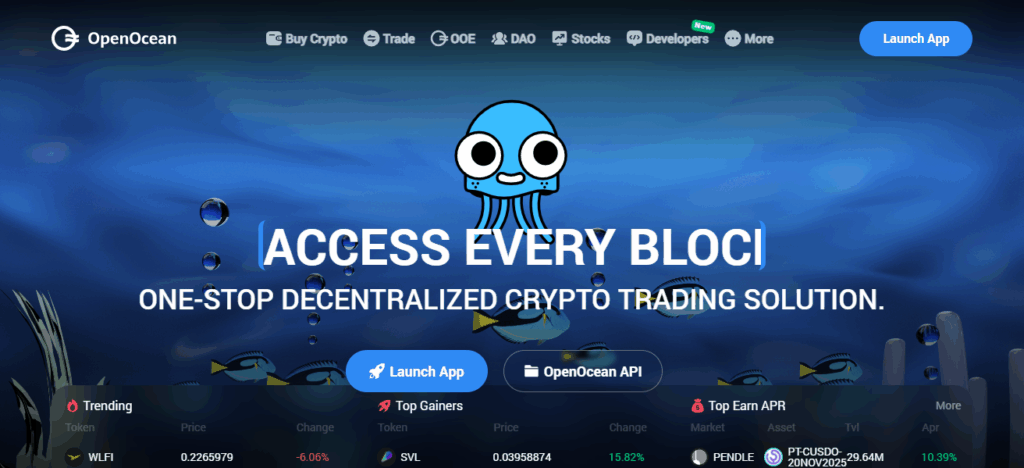
With the integration of Celer’s IM Framework, OpenOcean supports simplified user experiences by allowing one-time approval functions even for tiny transactions.
| Feature | Description |
|---|---|
| DEX Aggregator | Compares liquidity across multiple DEXs |
| Cross-Chain Swaps | Supports seamless swaps across chains |
| CeFi + DeFi Routing | Combines centralized and decentralized liquidity sources |
| Supported Chains | Ethereum, BNB Chain, Polygon, Fantom, and more |
| Slippage Control | Offers customizable slippage settings |
4.Matcha
Developed by 0x, Matcha is an intuitive dex aggregator that obtains liquidity from more than 100 exchanges on 7 different networks. It is a cost-effective solution for small traders, as all Matcha transactions, including regular and cross-chain swaps, are completely free.
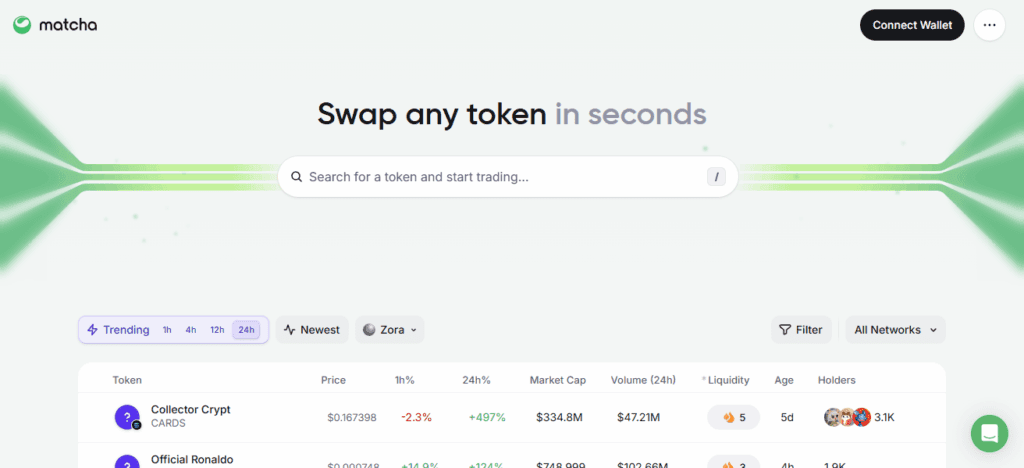
Moreover, Matcha offers Smart Routing for MEV protection, shielding users from sandwich attacks. Matcha is also gasless and offers limit order swaps, which improves convenience for small transactions.
| Feature | Description |
|---|---|
| Built on 0x Protocol | Uses 0x for deep liquidity and smart routing |
| Trade Splitting | Splits orders across DEXs for best execution |
| UI Simplicity | Clean, beginner-friendly interface |
| Supported Chains | Ethereum, Polygon, BNB Chain |
| Slippage Settings | Advanced control for professional traders |
5.ParaSwap
ParaSwap is a decentralized service that helps users find the best trading rates by switching the order of execution of trades across the blockchains it operates on. This optimization is achieved through the integration of multiple decentralized exchanges (DEXs).
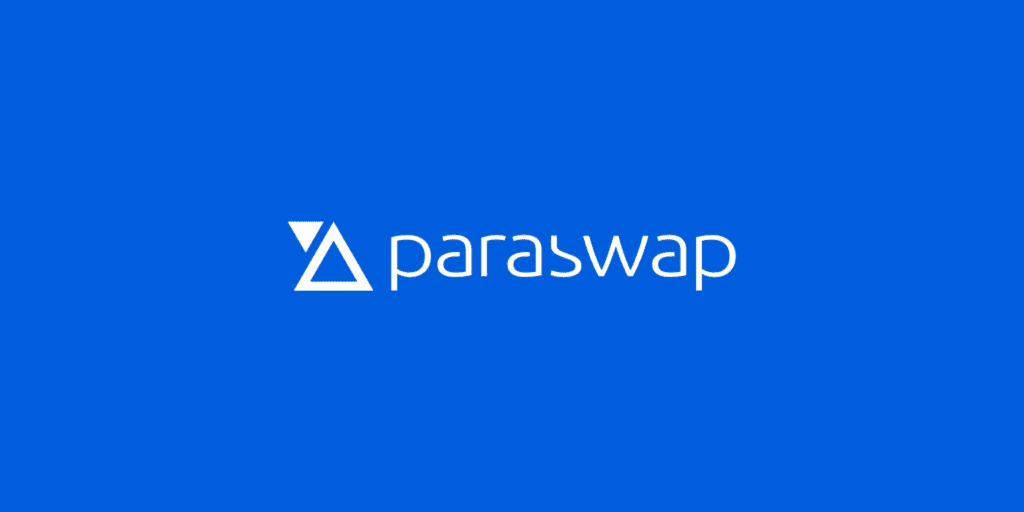
As a result, small trades are efficiently one of the lowest-priced blockchain systems available. Advanced algorithms used with ParaSwap manage trades with lower or even no slippage. This makes the platform ideal for users who find slippage to be a nuisance.
| Feature | Description |
|---|---|
| Smart Routing | Finds best prices with minimal slippage |
| Gas Refunds | Offers gas refunds for eligible users |
| Supported Chains | Ethereum, Polygon, BNB Chain, Avalanche |
| API Access | Available for developers and trading bots |
| Token Coverage | Extensive support across major chains |
6.Across Protocol
The Across Protocol is an intent-based cross-chain bridge designed for fast and low-cost blockchain interoperability across multiple chains including Ethereum, Arbitrum, Polygon, and zkSync.
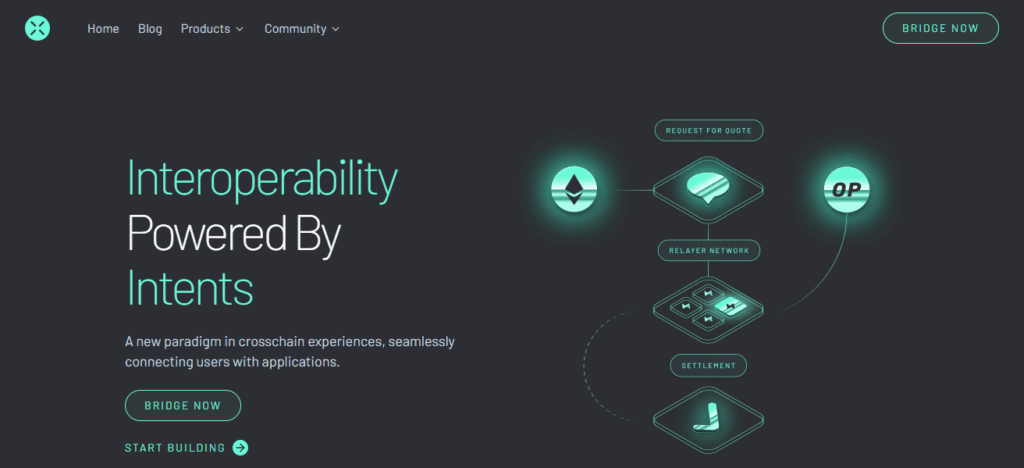
The protocol aims to securely and efficiently transfer values across different blockchains, thus catering to use cases where small cross-chain transactions are required.
| Feature | Description |
|---|---|
| Fast Bridging | Optimized for speed and low fees |
| Liquidity Pools | Uses relayers and liquidity providers |
| Supported Chains | Ethereum, Arbitrum, Optimism, Base |
| Security Model | Relayer-based with fraud proofs |
| Ideal For | Small, fast cross-chain transfers |
7.Synapse Protocol
Synapse Protocol works as a communication framework system and simplifies connections across EVM and non EVM chains through generalized message communication.
Also, it enables effortless movement of digital assets across siloed blockchains, calls to smart contracts, and NFTs. Synapse has built a reputation as the most trusted and widely used tool for bridging assets across different networks.
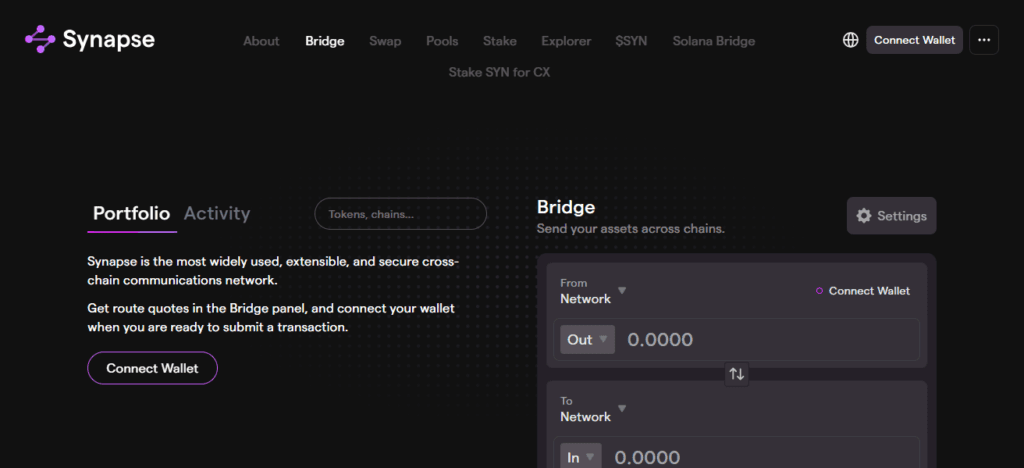
It can also be used to perform mini transactions that require seamless interoperability across varied blockchain networks.
| Feature | Description |
|---|---|
| Cross-Chain Liquidity | Enables DeFi interoperability across chains |
| AMM Integration | Uses automated market makers for swaps |
| Supported Chains | Ethereum, Avalanche, BNB Chain, Arbitrum, and more |
| Token Bridging | Supports stablecoins and native assets |
| Use Case | Ideal for dApps needing cross-chain liquidity |
8.Portal Token Bridge
Portal Token Bridge, powered by Wormhole, is a cross-chain bridge that enables seamless token transfers across multiple blockchains in a fast manner.
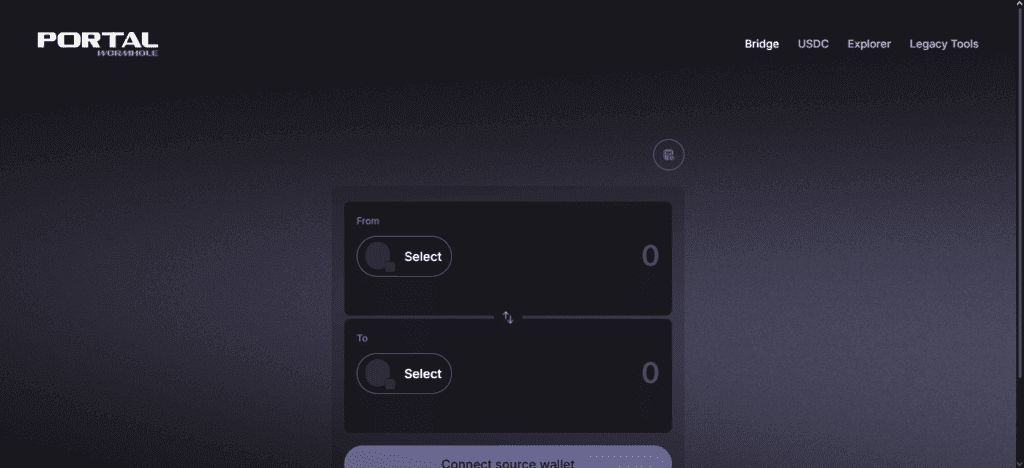
It offers cross-chain token transfers for a multitude of chains which include Solana, Cosmos, Aptos, and Sui. The platform is optimized for low-cost transfers, which is ideal for small cross-chain transactions.
| Feature | Description |
|---|---|
| Speed & Efficiency | Focused on fast, low-cost token transfers |
| Security | Uses Solana’s Wormhole infrastructure |
| Supported Chains | Solana, Ethereum, BNB Chain, Polygon, and more |
| Token Support | Wide range of assets including wrapped tokens |
| Ideal For | Users needing quick swaps between Solana and EVM chains |
9.Hop Protocol
Hop Protocol is a bridge that allows functions like token transfers between Ethereum layer 2 networks and Ethereum. It aims for instantaneous transactions and aims for low-fees making it ideal for small transactions for layer 2 solutions like Optimism and Arbitrum.
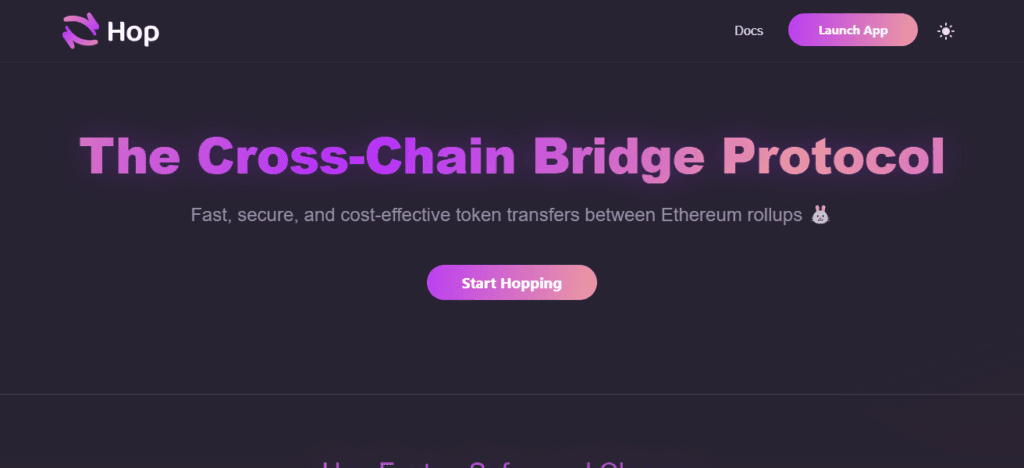
The Hop Protocol focuses on scalability and user experience to make sure all small trades are done forma efficient and executable manner.
| Feature | Description |
|---|---|
| Layer 2 Transfers | Specializes in Ethereum L2 bridging |
| Speed | Near-instant transfers across L2s |
| Supported Chains | Ethereum, Arbitrum, Optimism, Polygon |
| Liquidity Pools | Uses AMMs for efficient bridging |
| Ideal For | Small, frequent L2-to-L2 transfers |
10.Allbridge
Allbridge is an example of technology that allows users to easily swap assets across differnt blockchains like they were done on Solana, Ethereum, or Binance. Allbridge works with numerous tokens and aims to make transfers cheap and effective.
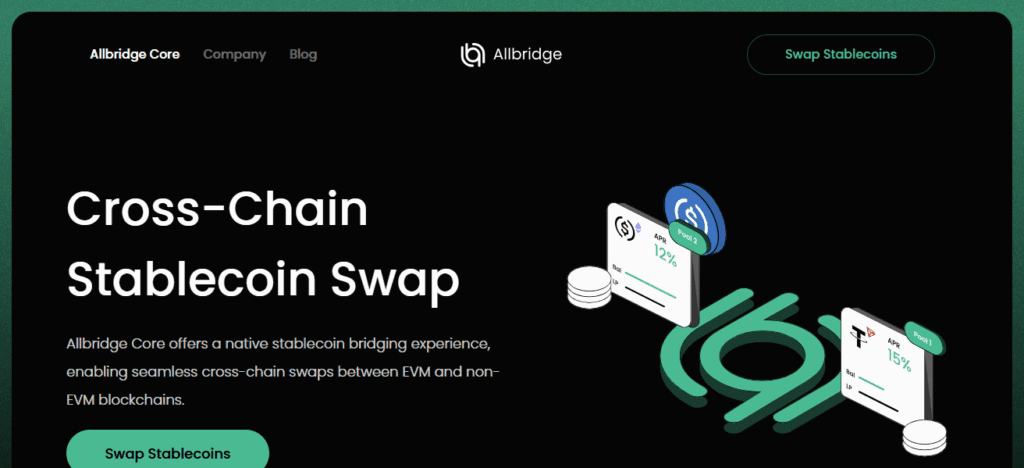
Allbridge is a viable option for users looking to make Allianz transactions on different chain networks due to the Allbridge intuitive user interface along with multi-chain support.
| Feature | Description |
|---|---|
| Multi-Chain Support | Bridges assets across EVM and non-EVM chains |
| Token Flexibility | Supports stablecoins, native tokens, and wrapped assets |
| Supported Chains | Solana, Ethereum, BNB Chain, Polygon, Near, and more |
| UI Simplicity | Easy-to-use interface for beginners |
| Ideal For | Users transferring assets between diverse ecosystems |
Conclsuion
In conclsuion For very small transactions, the most advantageous cross-chain aggregators provide minimal charges, swift execution, and extensive network support. Aggregators such as 1inch, Matcha, and ParaSwap dominate on smart routing efficiency, while Across and Hop Protocol bridges shine on speed and low costs.
The final selection is on the cross-chain, token, and priorities on speed, cost-effectiveness, or ease of use.
FAQ
They minimize fees, reduce slippage, and optimize speed—perfect for low-value transfers.
Across Protocol, Hop Protocol, and ParaSwap are known for cost efficiency.
1inch, OpenOcean, and Allbridge support a wide range of blockchains.











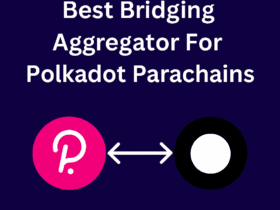

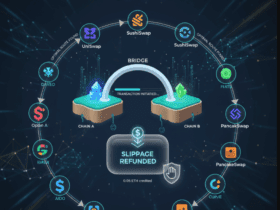
Got a Questions?
Find us on Socials or Contact us and we’ll get back to you as soon as possible.